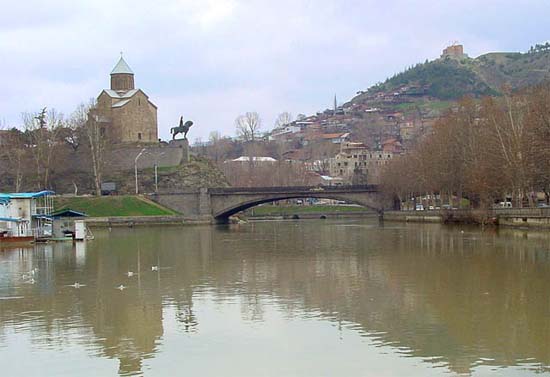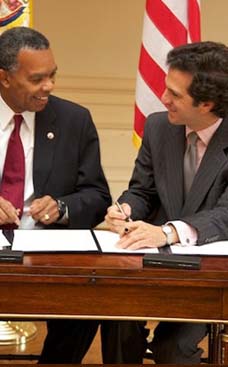
Georgia faces an altogether different set of expectations from other countries in its NATO application process that cannot be resolved by deft diplomacy or good reforms alone. For Georgia to truly make headway towards Euro-Atlantic integration, it must make the cost of another Russian invasion unacceptably high for Moscow. Though Tbilisi would never win in an arms race with Russia, it can at least develop its defenses to a point where Moscow's threshold for a military option is appreciably raised. A more secure geostrategic position coupled with strong reform progress is the only way for Georgia to ever have a chance of joining NATO and forever freeing itself from the long arm of Moscow.
Georgia RPCV Michael Hikari Cecire writes: Georgia's NATO Dream
Georgia's NATO Dream
Thursday, April 29, 2010
Print This Post Save As PDF
By Michael Cecir
If there was ever any doubt that of the NATO membership process being a political exercise, one needn't look further than the Alliance's decision to grant tiny, fractured Bosnia-Herzgovinia a Membership Action Plan on April 22 during the NATO gathering in Tallinn.
According to EUObserver, NATO chief Anders Fogh Rasmussen marked Bosnia's accession to the traditional integration pathway with caveats over the country's readiness, underlining the divisions within the Alliance over the MAP.
"Last night Nato foreign ministers made an important decision to invite Bosnia and Herzegovina to join Membership Action Plan, but made clear that there are still important reform issues that need to be solved," said Rasmussen. [1] However, another NATO statement glossed over uncertainties.
"Bosnia and Herzegovina has made significant progress on reform," said the NATO statement. "NATO foreign ministers welcome its decision on destruction of surplus ammunition and arms and its new ISAF contributions [soldiers in Afghanistan]."
Alliance disagreements notwithstanding, it's now become only a matter of time before Bosnia joins the 27-member security pact, as no country to be awarded a MAP has ever been denied eventual entry. Naturally, however, the Tallinn decision also begs a question over NATO's political priorities. Bosnia, for whatever its merits, can hardly be considered a more adequate candidate for NATO than Georgia, whose own ISAF contributions significantly outweigh that of Bosnia's. Currently, nearly 1000 Georgian troops are engaged in both reconstruction and peacekeeping operations in Afghanistan with no national caveats. Bosnia has ten.
On broader measures, Georgia also does better. Though Bosnia and Georgia rank similarly according to Freedom House's 2009 Freedom in the World index, at 4:3 and 4:4, respectively (lower is better), Georgia is far ahead according to the Heritage Institute's 2010 Index of Economic Freedom (26th place to Bosnia's 110th) and Transparency International's 2009 Corruption Perceptions Index (66th to Bosnia's 99th). [2]
By any objective measure both military and socio-economic Georgia should have gotten a MAP long before Bosnia, which is arguably faces an equally, if not greater, challenging set of political circumstances borne from violence in the 1990s. Bosnia's greatest advantage over Georgia, however, seems to be the comparative lack of patronage by Moscow to its own separatists. Though Russia has expressed support for the Serbian enclave in Bosnia, its geographic distance and relative obscurity on the Kremlin's foreign policy agenda (compared to Georgia or even Serbia and Kosova) make Russia's political investment in Bosnia a far lesser challenge to its application for a MAP. This is similarly true for Macedonia, which would have already achieved NATO membership were it not for a Greek veto over its name, or Albania, which has already joined the Alliance.
Though NATO representatives have in denied Russia's influence in Georgia's membership bid in the past, these counter-examples of NATO alignment by states showing, in many cases, even less progress than Georgia makes these denials dubious. Accordingly, it is long past time for NATO to acknowledge this reality for what it is rather than obscuring its true rationale with rhetoric about reform.
Still, among most foreign policy analysts, it's no great secret that Georgia's stalled proposal for NATO membership is being held captive by Moscow and, by proxy, the interests they command in Europe. Obviously, Georgia cannot accede to the Atlantic Alliance under the same standards as other countries.
Instead, Georgia's unique position requires a different set of solutions. First, Georgia must continue to pursue meaningful reforms aggressively and consistently. Although there are many elements in Georgia's political class both in government and the opposition that would prefer to slow, stop, or even reverse the trend in reforms, the chance for NATO accession will heavily rely on the quality and reach of Georgia's reform process. In the 1990s, similar doubts clouded the case for the Baltic states' applications to NATO, but the speed and thoroughness of reforms left no doubt of those countries' readiness, and deservedness, for NATO membership. In other words, Georgia must be far and away better on every metric to earn realistic consideration, let alone join. This must go beyond the preachy pronouncements regularly aired by Georgian politicians about successful reforms, but rather should be reflected in such things as economic growth, peaceful and democratic transfers of power, a viable loyal opposition, and a truly free media.
Also, Georgia's precarious defense situation vis-ΰ-vis Russia simply must be resolved. Without a doubt, under present and foreseeable conditions, there is no appetite in NATO to accept a member that is constantly harassed by the specter of war with Russia. In some ways, this is something of a chicken-and-egg situation. Many Georgian policymakers regard NATO as the single best way to deter Russian aggression, yet NATO is unlikely to invite Georgia to the Alliance if it is perceived as a simmering crisis waiting to happen. This is not a conundrum that can be solved merely through good trade relations or even inordinate contributions to international peacekeeping efforts, but will require devising a strategy that will either persuade or compel Moscow to treat Tbilisi with greater respect for its territorial integrity and, more importantly, its foreign policy orientation.
In some quarters, this has translated into pushing for concessions to Moscow or even mortgaging Georgian sovereignty for greater leniency from the Kremlin. Putting aside the fact that such a policy would obviously negate NATO membership and defeat the purpose of Georgia's quest for inclusion into the Alliance, NATO itself is unlikely to be in any hurry to invite states that it sees as Russian proxies. More to the point, a Moscow-aligned Georgia is not likely to fulfill the reform and governance requirements of NATO for accession. Clearly, this is a non-option.
Alternately, a more plausible option for Georgia would be to create conditions in which Russia has no choice but to withdraw its aggressive posture towards Georgia. As this is unlikely to be fulfilled by mere acts of diplomacy even recognizing Abkhazia and South Ossetia as independent would not satisfy Russian foreign policy goals Georgia should instead look to make the proposition of another invasion one of unacceptably high risk to Russia.
Currently, Georgia's military is oriented towards interoperability with NATO operations and command structures probably in an effort to prove' its worth as a NATO partner. Though laudable, on its own it will almost assuredly not result in NATO membership. Instead, Georgia's military should be developed expressly and explicitly for the task of territorial defense.
Creating this ability in the Georgian armed forces would be no minor task, as it involves not just a quantitative increase in the size of its military, but also in procuring defense systems and acquiring new capabilities. Perhaps more than anything, Georgia may want to reconsider its current focus on its ground forces, which alone will never be able to resist a full Russian invasion. Rather, the Georgian armed forces should consider investing in its long-neglected and near-invisible air forces, which can more quickly respond to defense contingencies and act as force multipliers for ground and naval forces. Conceivably, a couple of squadrons of multirole fighters could police Georgian airspace and allow for ground attack units like its existing SU-25s and attack helicopters to support ground operations. Perhaps more importantly, the deterrent role of an advanced air force could prevent such a situation from ever happening in the first place.
Of course, there are obstacles to acquiring this capability as well. Besides the steep costs normally associated with procuring and maintaining advanced fighters, the de facto arms embargo that is currently in force against Georgia makes acquiring such equipment doubly hard. However, the case for selling Georgia defensive equipment is a comparatively much simpler task than banking on a sudden change of heart by NATO, and particularly more-so given France's apparent willingness to sell Russia a wish list of arms. [3] Though hardly a foregone conclusion, there are enough potential sellers of multirole jet aircraft both new and secondhand to leverage a purchase of the equipment Georgia needs to defend itself.
Georgia faces an altogether different set of expectations from other countries in its NATO application process that cannot be resolved by deft diplomacy or good reforms alone. For Georgia to truly make headway towards Euro-Atlantic integration, it must make the cost of another Russian invasion unacceptably high for Moscow. Though Tbilisi would never win in an arms race with Russia, it can at least develop its defenses to a point where Moscow's threshold for a military option is appreciably raised. A more secure geostrategic position coupled with strong reform progress is the only way for Georgia to ever have a chance of joining NATO and forever freeing itself from the long arm of Moscow.
Michael Hikari Cecire is a writer and independent analyst living in Tbilisi. A former Peace Corps Volunteer in Georgia, he is a frequent commentator on economic development and South Caucasus policy issues. In addition to Evolutsia.Net, Cecire has also written for the Caspian Business Journal, the London Telegraph, World Politics Review, and TCS Daily, among others. This article first appeared at Evolutsia.Net, a news and analysis blogozine covering the political landscape of Georgia republic.
Footnotes
[1] http://euobserver.com/13/29924
[2] See: http://www.freedomhouse.org; http://www.heritage.org/index; and http://www.transparency.org/policy_research/survey s_indices/cpi/2009
http://georgiandaily.com/index.php?option=com_cont ent&task=view&id=18240&Itemid=132












